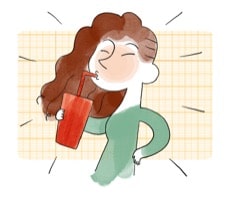Herbal teas and infusions
So you like herbal tea? You're in luck! Herbal teas and infusions offer a large panorama of curative virtues for minor inconveniences in your daily life. Here's a little natural tip: you must make the difference between tea and herbal tea (or infusion). Even though both have energizing properties, only tea contains caffeine (in this case called theine), an alkaloid that stimulates the central nervous system and can cause insomnia, diarrhea, cold sweats and even vertigo.
Here is a list of beneficial infusions and the ills they cure. Many benefits are the same, but the infusions are ordered according to they way in which they are most commonly used: don't simply take the herbal tea whose plant is the easiest to find! If you're pregnant, be careful and only follow advice from specialized sources.
Calming herbal teas with sedative properties
These plants taken as infusions are ideal to fall asleep. Take them before going to bed or to fight insomnia, but also if you have anxiety or nervousness issues.
- Lemon balm: Lemon balm is a sedative and a relaxant. It calms anxiety, promotes sleep, and fights against migraines, painful menstruation and tachycardia. It is also an antispasmodic for the stomach and intestines, and it fights off viral infections.
- Valerian: Analgesic, antispasmodic and hypnotic, it is one of the plants with the greatest sedative power. On the other hand, taking it too regularly can lead to addiction, and you have to be careful to take it just before going to bed (if you drink it in small amounts, it can become a stimulant depending on your metabolism).
- Chamomile: Calming and antispasmodic, it is an anti-inflammatory that is used for arthritis and period pains. It is also good for digestion, antibacterial and antiviral, and gives a slight boost to the immune system.
- Passiflora: Particularly effective for insomnia, but also for anxiety and nervousness.
- Linden: Linden is a sedative and a light hypnotic good for insomnia. Like chamomile, it helps the immune system and encourages good blood circulation.
- Orange blossoms: If you are stressed out and can't stop worrying about it, try an infusion of orange blossoms. It fights against anxiety, and has a small digestive effect.
- Marjoram: This sedative and soothing plant can be used to treat nervousness and insomnia, but also canker sores (if you do not have baking soda at hand), stomach pain and nausea.
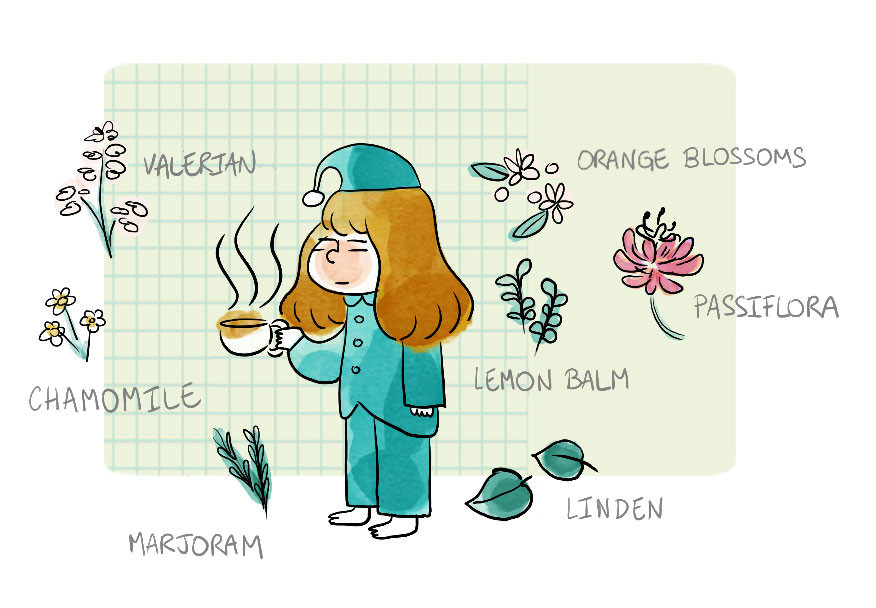
Stimulating and energizing herbal teas
- Nettle: Nettle is above all a plant full of nutrients that has a detox effect. Calcium, magnesium, iron, chlorophyll ... it gives you a boost in case of anemia, decreases allergies, is diuretic, and is the herbal tea of choice if you have arthritis, back problems (sufferers of lumbago and sciatica, we hear you), and rheumatism of all kinds. If you are pregnant, enjoy the virtues of nettle throughout your pregnancy without fear.
- Ginseng: Ginseng stands out by fighting diabetes. Anti-stress, it is also an antioxidant and improves bad cholesterol. Its roots are full of vitamins (A, B, C, E and K), and it will cheer you up if you suffer from anxiety or depression.
- Rosehips: The specialty of rosehips is vitamin C. To be taken in case of diarrhea, anemia, if you need an antiseptic or a diuretic. Avoid drinking too much if you do not want to end up with a strong laxative effect ...
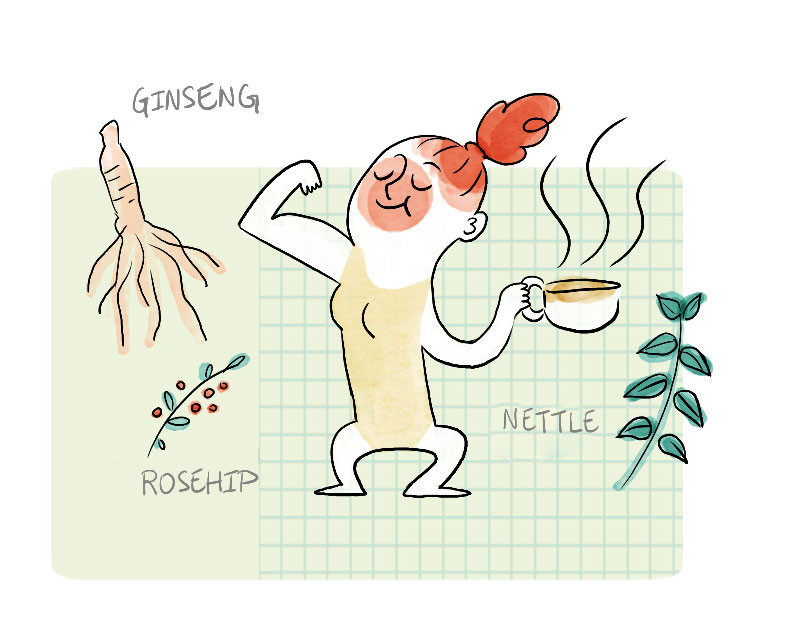
Digestive and blood thinning herbal teas
These herbal teas are good for the stomach and the intestines and improve circulation. Careful not to take any if you've already taken a blood thinning medication! Too much blood thinner would be bad for your blood.
- Fennel: Good for heaviness and bloating, fennel also stops nausea, vomiting, and prevents intestinal gas (no matter which side the gas comes out). It also stops abdominal spasms, menstrual pains, and inflammation of the respiratory tract.
- Ginger: Ginger is an excellent digestive that calms acid re-flux, indigestion and nausea (pregnant women, take note!). It reduces period pains and is an unrivaled blood thinner. Fennel is even said to have aphrodisiac properties ...
- Rosemary: Thanks to rosemary, your brain will be well oxygenated and you will warm your feet and your hands with good blood circulation. You can take it instead of coffee in the morning for a boost to clear your mind. Also try a cup if you are tired, it also has a calming effect on the digestive system and breathing.
- Gingko: Good for the heart and blood, it is full of antioxidants and brings oxygen to the brain, just like rosemary.
- Star anise: For gastrointestinal disorders, gall bladder, but also bladder spasms. If you have problems with blood pressure or heart problems, hormonal disorders or hot flushes due to menopause, or even worries of anxiety and depression, try the star anise with its aphrodisiac effects.
- Rooibos: Rooibos is the champion against cardiovascular diseases (even better than green tea). It is more effective than gingko to preserve aging skin, it helps blood circulation and has a large amount of nutrients (magnesium, calcium, zinc, manganese) and antioxidants. Also and antispasmodic, it is good for hay fever, diabetes, gastric problems and blood pressure.
- Sage: For stomach cramps and bloating, but also for menopause (exactly like rooibos). Antiseptic, anti-inflammatory, antispasmodic, sage is a panacea for sore throats.
- Peppermint: Antiseptic, analgesic and antispasmodic, peppermint is full of antioxidants, making it a super blood thinner. It is also carminative (that is, it helps to expel gases), which facilitates digestion and stimulates the stomach and liver. Be careful not to drink it before going to bed! You might be a little too stimulated to be able to fall asleep.
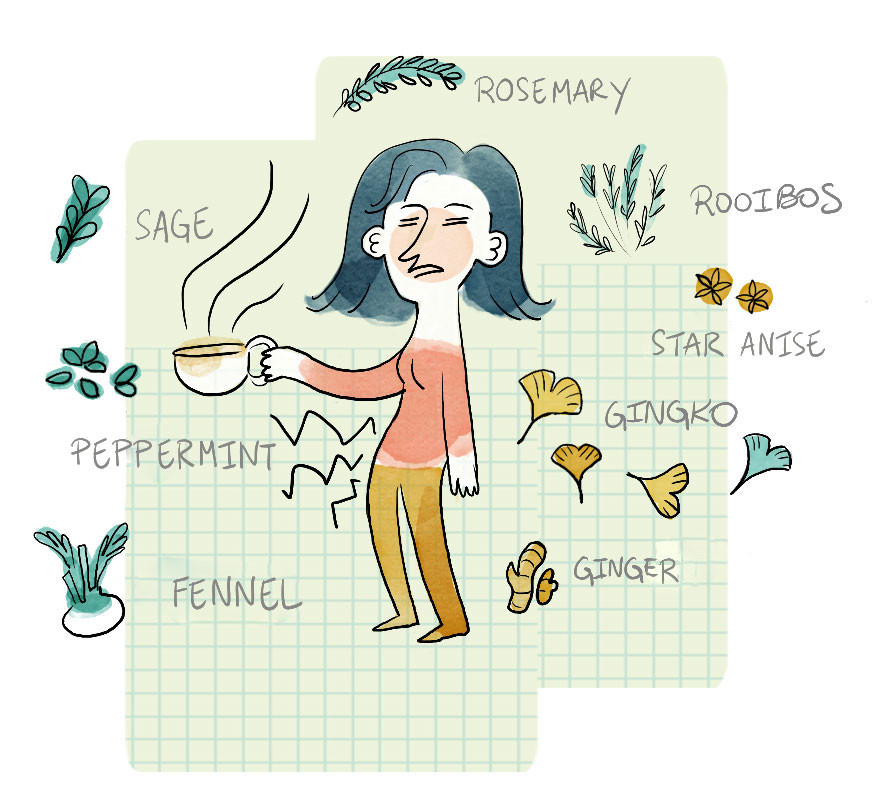
Preventative herbal teas
If you catch a cold, have a fever or difficulty breathing, these herbal teas will help you get over it. They are the ones you should drink in the midst of winter, when your nose is running and your throat is always sore.
- Yarrow: Against colds, it especially helps to lower fevers. It regularizes the menstrual cycle by reducing abundant bleeding, helping against varicose veins and cellulite, and has digestive properties as well.
- Elderberry: Elderberry lowers fever and prevents respiratory infections. With a boost to the immune system, count on the elderberry for its many antioxidants.
- Thyme: Thyme is great to kick intestinal parasites outside of your body. In addition to dealing with diarrhea, bloating, and various flatulence problems, it relieves colds, flu and angina thanks to its expectorant properties. Antiviral and antiseptic, it is also antispasmodic.
- Hypericum (St. John's Wort): Hypericum will relieve your sadness because its main benefits are anti-depressive. Prevent your winter blues with this exceptional emotional boost. Bonus: It is also effective for cramps and toothaches.
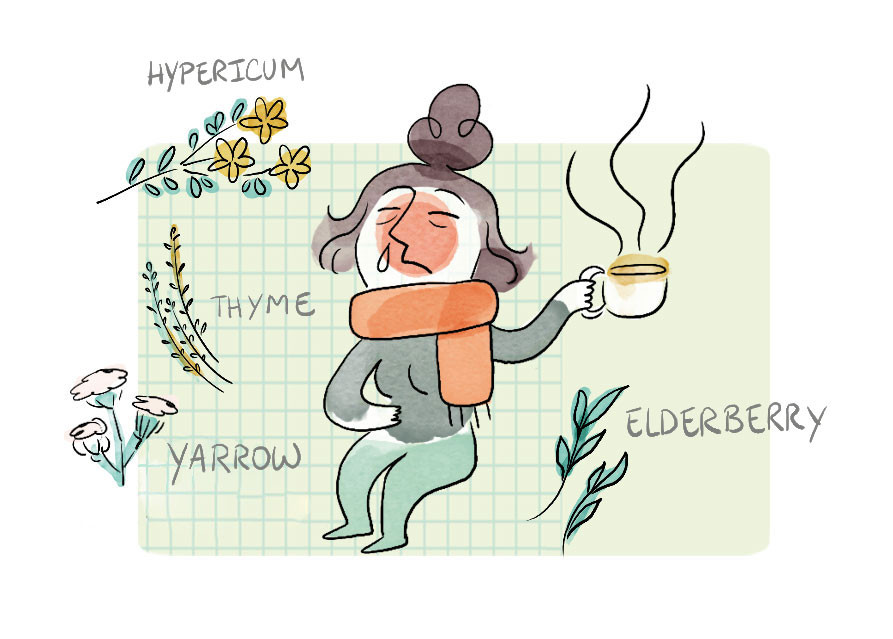
Liked it? Share :)
